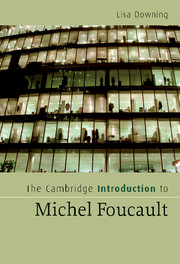Book contents
- Frontmatter
- Contents
- Preface
- List of abbreviations
- 1 Life, texts, contexts
- 2 Works: madness and medicine
- 3 Works: the death of man
- 4 Works: authors and texts
- 5 Works: crime and punishment
- 6 Works: The History of Sexuality
- 7 Critical receptions
- Afterword
- Notes
- Selected further reading
- Index
- The Cambridge Introductions to …
1 - Life, texts, contexts
Published online by Cambridge University Press: 05 September 2012
- Frontmatter
- Contents
- Preface
- List of abbreviations
- 1 Life, texts, contexts
- 2 Works: madness and medicine
- 3 Works: the death of man
- 4 Works: authors and texts
- 5 Works: crime and punishment
- 6 Works: The History of Sexuality
- 7 Critical receptions
- Afterword
- Notes
- Selected further reading
- Index
- The Cambridge Introductions to …
Summary
I don't find it necessary to know exactly what I am. The main interest in life and work is to become someone else that you were not in the beginning.
Michel FoucaultDidier Eribon opens his biography of Foucault with the following assertion: ‘Writing a biography of Michel Foucault may seem paradoxical. Did he not on numerous occasions, challenge the notion of the author, thereby dismissing the very possibility of biographical study?’ Having presented this problem, Eribon procedes with the caveat: ‘even so, Foucault could not isolate himself from the society in which he lived. He, like everyone else, was forced to fulfil the “functions he described”’. Throughout this book, and particularly in this opening chapter on Foucault's intellectual and social contexts, I will be sensitive to the particular tension raised by the prospect of writing about the life and influences of Michel Foucault, a thinker who insisted many times that the self should be an ongoing process of creation rather than a fixed identity or personality. As he famously remarked: ‘Do not ask me who I am and do not ask me to remain the same’ (AK, p. 19). Instead of trying to make him remain the same, then, instead of uniting the various Foucaldian voices, I shall provide an introduction to his texts, and to the contexts from which they arise, that is broadly sympathetic to his critique of biographical criticism.
- Type
- Chapter
- Information
- The Cambridge Introduction to Michel Foucault , pp. 1 - 21Publisher: Cambridge University PressPrint publication year: 2008

